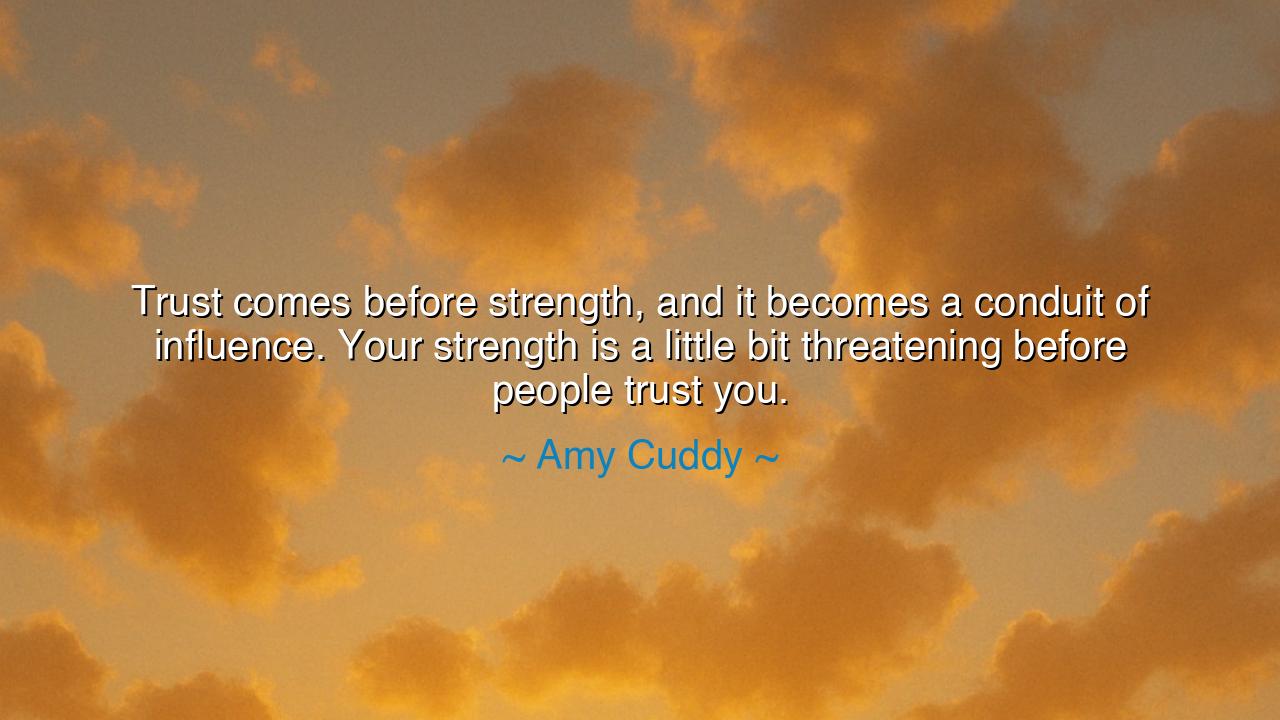
Trust comes before strength, and it becomes a conduit of
Trust comes before strength, and it becomes a conduit of influence. Your strength is a little bit threatening before people trust you.






Hearken, O children of the ages yet to come, and lend your ears to the wisdom of Amy Cuddy, who speaks to the eternal dance between trust and strength. She declares that trust comes before strength, for without trust, strength can appear as a threat, a looming force that intimidates rather than inspires. Only when hearts are open, when confidence and faith are established, can strength flow as a conduit of influence, shaping others not through fear but through willing respect.
The origin of this insight springs from the study of human presence, leadership, and persuasion. Cuddy, a scholar of behavior and communication, observed that in the realm of influence, it is not sheer power that opens doors, but the cultivation of trust. Leaders who stride forth with only displays of dominance may command attention, but they rarely capture loyalty. Yet those who first earn trust transform their strength into a force welcomed rather than resisted. Thus, trust is the fertile soil in which the seeds of strength may grow into trees of enduring influence.
Consider the meaning of strength without trust. The general who rules by fear may see obedience in the short term, but rebellion brews in secret hearts. The ruler who is trusted, however, wields authority that endures beyond the battlefield. Strength, when unveiled before trust has taken root, can overwhelm, causing others to recoil. But once trust is secured, strength becomes not a threat but a shield, a fortress that inspires security and devotion.
History offers a vivid testament. Reflect upon George Washington, who was entrusted with command of a fledgling army and later with the presidency of a newborn nation. His strength as a leader was immense, yet it was the trust he cultivated through humility, honesty, and steadfastness that made his influence enduring. Had he relied only on military power, he would have been feared as a conqueror; but because trust preceded strength, he was revered as a father of his country.
Emotionally, Cuddy’s words remind us of the fragility of human connection. When we reveal only power, others may brace against us, seeing danger rather than guidance. But when we extend trustworthiness, when we listen, when we care, then our strength is transformed into something welcomed, something that can uplift and protect. True leadership, whether in families, communities, or nations, arises from this union of trust and strength, with trust always paving the way.
The lesson is timeless: if you would influence, first build trust. Begin not with the display of power, but with acts of sincerity, empathy, and consistency. Show that your strength is not meant to dominate, but to safeguard and to serve. Once this foundation is laid, your strength will no longer be perceived as a threat but as a blessing, magnifying your ability to guide, protect, and inspire.
O seeker of wisdom, let this truth be engraved upon your heart: trust precedes strength, and together they form the pillars of influence. Cultivate trust through honesty and care, then let your strength shine forth, tempered by compassion. In this balance lies the essence of leadership that endures not through fear, but through love, respect, and willing loyalty.
Finally, let the lesson be passed down through the ages: power alone is brittle, but power joined with trust becomes unbreakable. Seek first to be trusted, then let your strength flow as a river of influence, shaping lives and generations with wisdom, courage, and humility, as Amy Cuddy so wisely proclaims.






AAdministratorAdministrator
Welcome, honored guests. Please leave a comment, we will respond soon